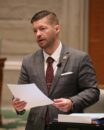JEFFERSON CITY, Mo. — Black lawmakers from Missouri are having what one described as an “I told you so” moment today as a new report from the Department of Justice claims that the Ferguson Police Department is riddled with racial policies and illegal practices.
“Following a comprehensive investigation which began on Sept. 4, 2014, the Justice Department’s Civil Rights Division has determined that the Ferguson, Missouri, Police Department (FPD) has engaged in a pattern or practice that results in conduct that routinely violates the Constitution and federal law,” a summary of the report reads.
The report goes into alarming detail about numerous instances of police overreach, brutality, or racial profiling. Some of Missouri’s most outspoken black elected officials responded to the report.
“It highlighted what everyone already knew,” said Sen. Jamilah Nasheed, a St. Louis Democrat. “That you have institutionalized racism in the Ferguson Police Department. In order for us to move forward as a community and as law enforcement, we’re going to have to weed out the bad apples. Not all cops are bad cops. I think they need to dismantle Ferguson [police department] and allow for a municipality that may not have all these race issues.”
Nasheed said that while the DOJ report shined a light on Ferguson, many other municipalities were likely guilty of similar ills. Nasheed said the report validated much of what last summer’s protestors were claiming about local police.
“The protestors were saying it all summer,” Nasheed said. “No justice, no peace, no racist police. That’s been their slogan.”
Nasheed pointed to Sen. Eric Schmitt’s municipal court reform bill as one of the steps that the legislature needed to take to correct the racial imbalance in places like Ferguson, where the searing DOJ report points to the frequent practice of disproportionate jailing for minor crimes as a clear indicator of the police department’s concern for revenue over public safety.
“Ferguson’s law enforcement practices are shaped by the City’s focus on revenue rather than by public safety needs. This emphasis on revenue has compromised the institutional character of Ferguson’s police department, contributing to a pattern of unconstitutional policing, and has also shaped its municipal court, leading to procedures that raise due process concerns and inflict unnecessary harm on members of the Ferguson community,” reads the second page of the report.
Rep. Brandon Ellington, D-Kansas City, is Chair of the Missouri Legislative Black Caucus, and said he, like Nasheed, was unsurprised with the findings. Ellington has been a vocal supporter of bills mandating body cameras for Missouri police officers. Ellington believes the policy would greatly reduce racist behavior.
“One of the most significant things we can do is pass a video and audio law,” Ellington said. “You can actually go back, watch video and hear audio of an incident. That’s not going to stop racist practices, but at least it allows someone who is a victim of abusive practices to seek justice. I’m disheartened that this body has not taken up that legislation at all yet.”
Ellington said he’d heard no formal opposition to body camera proposals yet, and said that several individual police departments contacted him voicing support for the measure, as it can also serve to reduce false accusations against police. Ellington said he was upset that House leadership “apparently has no appetite” to advance the legislation.
Sen. Maria Chappelle-Nadal, who represents Ferguson, said legislation on multiple fronts was needed to combat “decades” of racial disparities highlighted by the DOJ report. Chappelle-Nadal has offered a wide range of bills directly related to Ferguson including bills mandating the use of body cameras and a lengthy bill modifying the state’s laws on racial profiling. But Chappelle-Nadal has been uniquely active since Brown’s death last August, something she says is just as important as legislation.
“It’s important to call people out,” Chappelle-Nadal said. “I’ve called the governor out when it was necessary, calling other elected officials out, calling the Democratic Party out. No one else could do that but me. Other people could do it, but they are took chicken to do it. They don’t have balls. Period. They don’t have the balls to call out people who have allowed this injury to happen for decades. Someone has to do that, to make sure Ferguson always stays relevant.”
Chappelle-Nadal says she wholeheartedly supports municipal court reform, but says such reforms won’t stop future cases like Mike Brown’s. Brown, who was stopped by an officer for walking in the street — a practice which the DOJ report says is almost exclusively reserved for black suspects — was a victim of the same racial profiling laid out in the report, Chappelle-Nadal said.
Ferguson Mayor James Knowles held a brief press conference responding to the report. Knowles took no questions and read a prepared statement in which he said those responsible for racist emails within the department had been either terminated or suspended and that the department would make stronger efforts to hire minority officers. Ferguson Police Chief, Tom Jackson, was not present.
Chappelle-Nadal, who said she “respected and admired” most police officers, pivoted frequently toward education both for active police officers and protestors, as well as the next generation.
“If kids aren’t getting that education, we see what the problems can be,” Chappelle-Nadal said.
Collin Reischman was the Managing Editor for The Missouri Times, and a graduate of Webster University with a Bachelor of Arts in Journalism.



